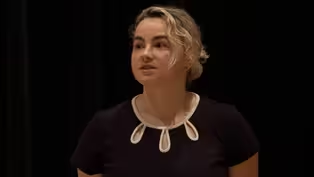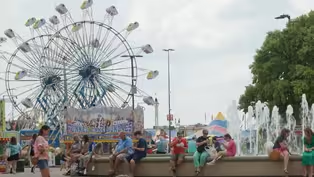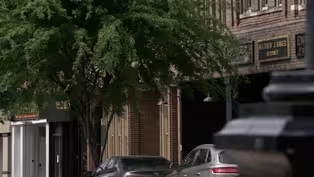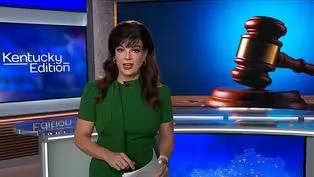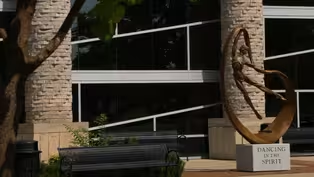
Bowling Green Prepares for Growth
Clip: Season 4 Episode 35 | 6m 22sVideo has Closed Captions
Bowling Green's city manager on population growth, new riverfront project.
Warren County is expected to double in size by 2050. A lot of that growth will happen in Bowling Green, which is already the state's third largest city. Renee Shaw caught up with city manager Jeff Meisel to learn about what the city is doing to prepare for that growth and about a new riverfront project that's already underway.
Problems playing video? | Closed Captioning Feedback
Problems playing video? | Closed Captioning Feedback
Kentucky Edition is a local public television program presented by KET

Bowling Green Prepares for Growth
Clip: Season 4 Episode 35 | 6m 22sVideo has Closed Captions
Warren County is expected to double in size by 2050. A lot of that growth will happen in Bowling Green, which is already the state's third largest city. Renee Shaw caught up with city manager Jeff Meisel to learn about what the city is doing to prepare for that growth and about a new riverfront project that's already underway.
Problems playing video? | Closed Captioning Feedback
How to Watch Kentucky Edition
Kentucky Edition is available to stream on pbs.org and the free PBS App, available on iPhone, Apple TV, Android TV, Android smartphones, Amazon Fire TV, Amazon Fire Tablet, Roku, Samsung Smart TV, and Vizio.
Providing Support for PBS.org
Learn Moreabout PBS online sponsorshipEarlier in the week, we told you Warren County is expected to double in size by 2050.
A lot of that growth will happen in Bowling Green, which is already the state's third largest city.
Renay Shaw caught up with City Manager Jeff Maisel to learn about what the city is doing to prepare for that growth, and about a new riverfront project that's already underway.
Jeff Maisel, thank you so much for sitting down with us.
Thank you.
In minutes.
Let's talk about being the Bowling Green City manager.
What does that mean?
Because there is a mayor.
There are city commissioners.
But what does the city manager do?
Well, I'm the, full time hired gun.
I guess you would say, chief operating officer in a way, to kind of keep, the day to day things running smoothly.
I, my city manager is supposed to provide, you know, more consistency over the long term as elected officials come and go.
Hopefully you have a city manager that's still in place, keeping things, running smoothly.
What are the main set of financial priorities for Bowling Green right now?
Well, we always, strive to put as much back into the community as as far as our budget goes.
Reinvest in our community, whether it be infrastructure with, with our parks, our our streets, our roads.
But, always number one is public safety.
If you don't have a safe community, you don't have a very good community.
That's that's your your foundation.
We've been hearing a lot about and been reporting all this week that Bowling Green, of course, is already the state's third largest city, but is expected to almost double in size.
And 25 years from now that you'd have a population well over 200,000.
So how are you planning for that kind of growth?
That seems like a pretty tall task.
Well, one thing that we realized, financially, is that we we needed to, have a bigger engine.
And so, we went to our board, a couple years ago and asked for, occupational tax rate adjustment back in 2003 to 2007, we were we had a 2% occupational tax.
That's a tax on your your paychecks and your your net profits.
And in 2007, it was lowered to 1.85%.
We we lived on that, for as long as we could, but in 2024, we felt it was time that we needed to try to get back to the 2% because we we saw all the demands coming.
We needed more police officers.
We needed more fire fighters.
We needed more fire stations, more police cars.
On and on and on.
We can look a few miles south and my native state of Nashville, Tennessee, where, they many would say that they did not plan for growth at the level at which they're experiencing.
And you think about the traffic, which is the first thing people complain about, but also there's water, sewer and all those other things.
Utilities.
It's not just roadways.
You're right.
And so, and speaking of roads and a lot of our roads are controlled by the state.
So there's not a lot we can do about that, but you will notice, we maybe you've noticed more roundabouts, right?
I have, and I think I did it right.
We like we like our roundabouts.
And they have we think they've been successful and collision free for the most.
And free your collisions are reduced and your the severity of your collisions are reduced.
You don't have the, you know, the the intersections, the T-Bone, collisions.
A roundabout is a nice and easy and slow and.
That's right.
You might have a few fender benders.
So your severity has gone way down.
And so we look for opportunities, for roundabouts.
And we we've done that over the last several years and working with the state, we have a great partnership with the state.
When we look at the state roads and what they need.
And so we're always looking for opportunities with, with traffic mitigation.
It's not a perfect science.
There will always be speeding and over overcrowding of roads, but we do the best we can.
And then, when it comes to, our parks, can you imagine a city without any parks?
Right.
I can't, it's.
I grew up here.
Some of the fondest memories I have as a child are going to our city parks, and so we want to keep that alive.
We want to keep them in good shape.
We want to try to add a few, as we go.
As our population increases.
You saw what happened during Covid.
People, wanted to get outside and they wanted to go to a park.
And so we want to keep that a higher priority as well.
And we've we've invested a lot in our park system, and we we hope to continue to do that.
And I do want to ask you about the Riverfront Park development project underway now.
Yeah, that's you know, this is this is going to be a big regional boon to have this kind of water recreation that this area doesn't enjoy right now.
Renee, it's going to be a total game changer when when it gets, built, especially the, the Whitewater, section that we're we get we got some grant for in a match.
So we got, pretty much $7 million in free money, to get started on that, we've got a good, stockpile of, funding for the park itself.
It's a 70 acre park.
That's cool.
Ten blocks from downtown, ten blocks from City Hall.
That's really step at all.
And so you'll step.
You'll you'll step out of the city into this.
Oasis, refuge that you'll never see anything like before.
When is this going to be complete?
We're hoping to, bid out phase one later this year.
That'll be have to be phased as we go.
Probably 2 or 3 phases, but, we're hoping to get started on, you know, actual moving some dirt around by at least the beginning of next year and, get some things moving down there.
But it's, it's going to be, totally something you'll, you'll you won't you won't feel like you're in Bowling Green.
Kentucky Democratic Party Tours in Support of Medicaid
Video has Closed Captions
Clip: S4 Ep35 | 3m 30s | The Democrats' kick off tour in Perry County, where 51% of the population has Medicaid insurance. (3m 30s)
Video has Closed Captions
Clip: S4 Ep35 | 2m 34s | The 11-day event is "All Things Kentucky. All in One Place." (2m 34s)
Making the Move From Nashville to Bowling Green
Video has Closed Captions
Clip: S4 Ep35 | 4m 26s | More Nashvillians finding their home in Bowling Green (4m 26s)
Safer Kentucky Act Being Tested in Court
Video has Closed Captions
Clip: S4 Ep35 | 1m 2s | Judge rules on class action lawsuit over Safer Kentucky Act. (1m 2s)
Venue Brings Broadway to Bowling Green
Video has Closed Captions
Clip: S4 Ep35 | 2m 56s | Spotlight on the Southern Kentucky Performing Arts Center (2m 56s)
Providing Support for PBS.org
Learn Moreabout PBS online sponsorship
- News and Public Affairs

Top journalists deliver compelling original analysis of the hour's headlines.

- News and Public Affairs

FRONTLINE is investigative journalism that questions, explains and changes our world.












Support for PBS provided by:
Kentucky Edition is a local public television program presented by KET
